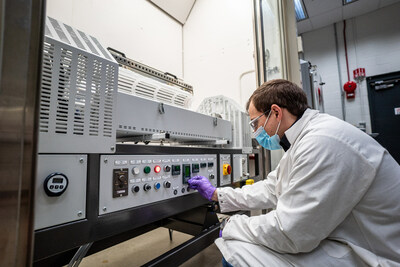Toyota and Argonne National Laboratory Investigate Recycling of Lithium-Ion Batteries
Rhea-AI Summary
Toyota partners with Argonne National Laboratory to investigate direct recycling process for lithium-ion batteries, focusing on cathode chemistries of nickel, manganese, and cobalt. The project aims to achieve cost and carbon footprint savings, contributing to Toyota's closed-loop battery ecosystem for sustainability.
Positive
Collaborative research with Argonne National Laboratory to develop a direct recycling process for lithium-ion batteries
Potential significant cost and carbon footprint savings through direct recycling
Contribution to Toyota's closed-loop battery ecosystem for sustainability
Negative
- None.
News Market Reaction 1 Alert
On the day this news was published, TM declined 0.28%, reflecting a mild negative market reaction.
Data tracked by StockTitan Argus on the day of publication.
Research project seeks to utilize a new process for recovering critical battery materials
Process can be used on end-of-life automotive batteries as well as manufacturing scrap
"Having Argonne utilize our commercial battery products will help us evaluate the direct recycling process at an industrial scale, in addition to other battery recycling technologies to maintain a diverse portfolio of recycling options for a diverse array of battery platforms and chemistries," says Nik Singh, Senior Scientist in the Toyota Research Institute of
For the project, Toyota will provide Argonne with both end-of-life and new Toyota batteries. Argonne will adapt and test its patent-pending direct recycling process with the batteries. Further, TRINA, Toyota's in-house entity for exploring next-generation technologies, will lend its expertise to validate this "proof-of-concept" study.
"Based on preliminary projections, direct recycling can potentially offer significant cost and carbon footprint savings," says Sarah Kennedy, Operations Manager of Toyota's Battery Lifecycle Solutions Business Development team. "Toyota's Battery Lifecycle Solutions entity will help identify the appropriate pathway for the potential future commercialization of this technology, pending the outcome of the CRADA, as the project is projected to deliver a net improvement in battery materials manufacturing costs, waste and carbon footprint."
The collaborative project with Argonne is part of Toyota's pursuit of designing a closed-loop battery ecosystem aimed at maximizing sustainability. In 2015, Toyota announced the Environmental Challenge 2050, a set of goals to achieve carbon neutrality across the vehicle lifecycle by 2050. For electrified vehicles, this includes battery recycling, whether after first use or after being repurposed or refurbished, to ensure that raw materials are extracted and put back into the production process.
Additional information about the project and Argonne's research at its ReCell Center can be found here.
About Toyota
Toyota (NYSE: TM) has been a part of the cultural fabric in the
Toyota directly employs more than 49,000 people in the
Through its Driving Possibilities initiative, the Toyota
For more information about Toyota, visit www.ToyotaNewsroom.com
MEDIA CONTACT:
Rick Bourgoise
richard.bourgoise@toyota.com
(313) 405-5972
![]() View original content to download multimedia:https://www.prnewswire.com/news-releases/toyota-and-argonne-national-laboratory-investigate-recycling-of-lithium-ion-batteries-302131116.html
View original content to download multimedia:https://www.prnewswire.com/news-releases/toyota-and-argonne-national-laboratory-investigate-recycling-of-lithium-ion-batteries-302131116.html
SOURCE Toyota Motor North America
FAQ
What is Toyota's research project with Argonne National Laboratory about?
Toyota and Argonne National Laboratory are investigating a direct recycling process for lithium-ion batteries, focusing on cathode chemistries of nickel, manganese, and cobalt.
What can the project potentially offer in terms of cost and carbon footprint savings?
The direct recycling process can potentially offer significant cost and carbon footprint savings.
What is the goal of Toyota's closed-loop battery ecosystem?
Toyota aims to maximize sustainability through its closed-loop battery ecosystem, ensuring raw materials are extracted and put back into the production process.










